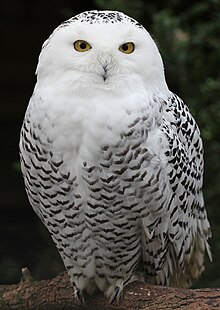Snowy owl
| Snowy owl | |
|---|---|
 |
|
| Male | |
 |
|
| Female | |
| Scientific classification | |
| Kingdom: | Animalia |
| Phylum: | Chordata |
| Class: | Aves |
| Order: | Strigiformes |
| Family: | Strigidae |
| Genus: | Bubo |
| Species: | B. scandiacus |
| Binomial name | |
|
Bubo scandiacus (Linnaeus, 1758) |
|
 |
|
|
Breeding Non Breeding |
|
| Synonyms | |
|
Strix scandiaca Linnaeus, 1758 |
|
Strix scandiaca Linnaeus, 1758
Nyctea scandiaca Stephens, 1826
The snowy owl (Bubo scandiacus) is a large, white owl of the typical owl family. Snowy owls are native to Arctic regions in North America and Eurasia. Males are almost all white, while females have more flecks of black plumage. Juvenile snowy owls have black feathers until they turn white. The snowy owl is a ground nester that predominantly hunts rodents.
The snowy owl was one of the many bird species originally described by Linnaeus in the landmark 1758 10th edition of his Systema Naturae, where it was given the binomial name of Strix scandiaca. The genus name Bubo is Latin for the Eurasian eagle-owl and scandiaca is New Latin for Scandinavia.
Until recently, the snowy owl was regarded as the sole member of a distinct genus, as Nyctea scandiaca, but mtDNA sequence data (Olsen et al. 2002) shows that it is very closely related to the horned owls in the genus Bubo. However, some authorities debate this classification, still preferring Nyctea.
This yellow-eyed, black-beaked white bird is easily recognisable. It is 52–71 cm (20–28 in) long, with a 125–150 cm (49–59 in) wingspan. Also, these owls can weigh anywhere from 1.6 to 3 kg (3.5 to 6.6 lb). The average lifespan in the wild is 9.5 years. It is one of the largest species of owl and, in North America, is on average the heaviest owl species. The adult male is virtually pure white, but females and young birds have some dark spots; the young are heavily barred, and dark spotting may even predominate. Its thick plumage, heavily feathered taloned feet, and colouration render the snowy owl well-adapted for life north of the Arctic Circle.
...
Wikipedia

